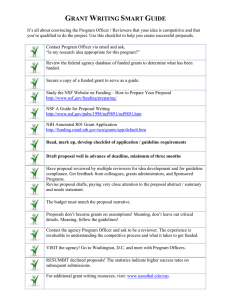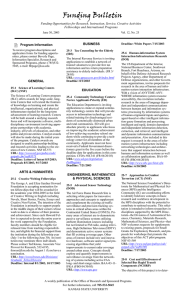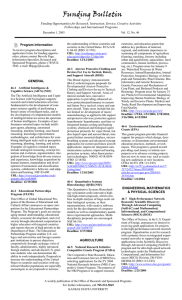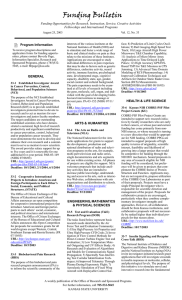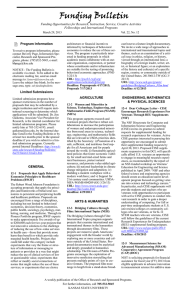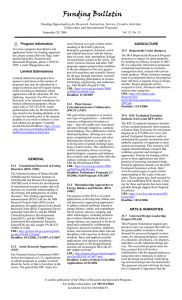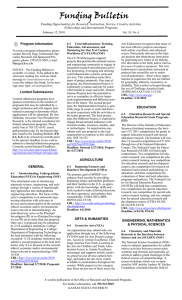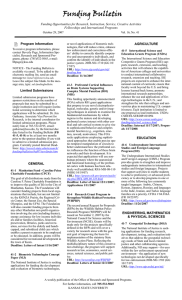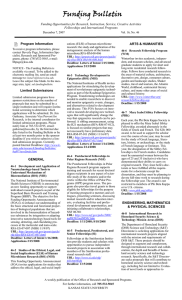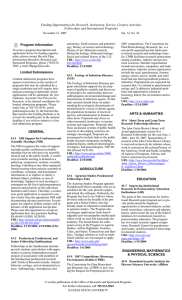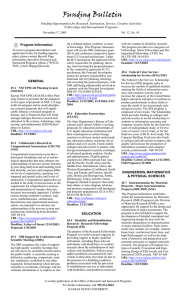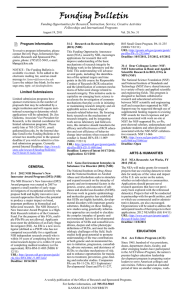Funding Bulletin
advertisement
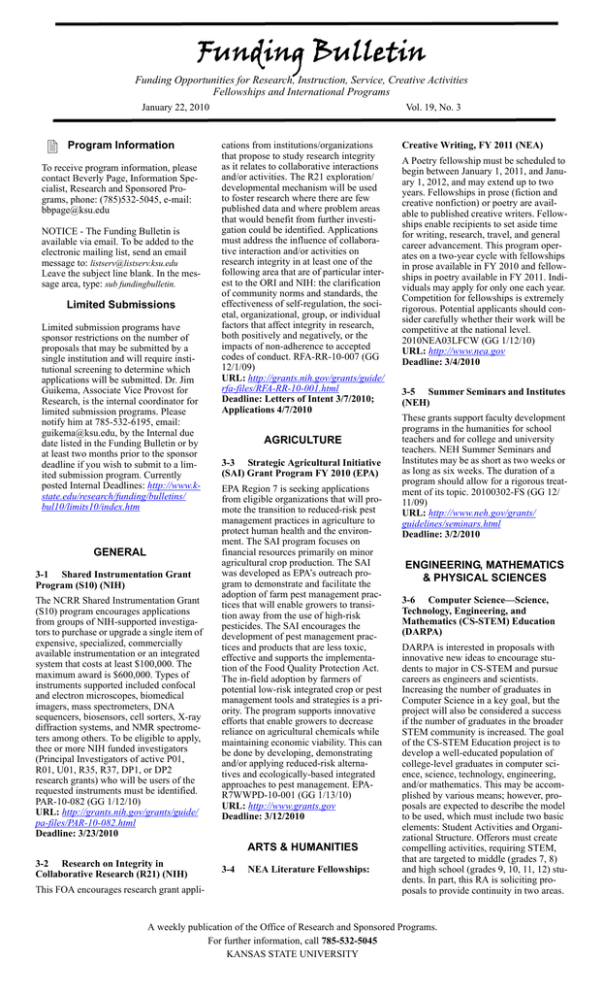
Funding Bulletin Funding Opportunities for Research, Instruction, Service, Creative Activities Fellowships and International Programs January 22, 2010 Program Information To receive program information, please contact Beverly Page, Information Specialist, Research and Sponsored Programs, phone: (785)532-5045, e-mail: bbpage@ksu.edu NOTICE - The Funding Bulletin is available via email. To be added to the electronic mailing list, send an email message to: listserv@listserv.ksu.edu Leave the subject line blank. In the message area, type: sub fundingbulletin. Limited Submissions Limited submission programs have sponsor restrictions on the number of proposals that may be submitted by a single institution and will require institutional screening to determine which applications will be submitted. Dr. Jim Guikema, Associate Vice Provost for Research, is the internal coordinator for limited submission programs. Please notify him at 785-532-6195, email: guikema@ksu.edu, by the Internal due date listed in the Funding Bulletin or by at least two months prior to the sponsor deadline if you wish to submit to a limited submission program. Currently posted Internal Deadlines: http://www.kstate.edu/research/funding/bulletins/ bul10/limits10/index.htm GENERAL 3-1 Shared Instrumentation Grant Program (S10) (NIH) The NCRR Shared Instrumentation Grant (S10) program encourages applications from groups of NIH-supported investigators to purchase or upgrade a single item of expensive, specialized, commercially available instrumentation or an integrated system that costs at least $100,000. The maximum award is $600,000. Types of instruments supported included confocal and electron microscopes, biomedical imagers, mass spectrometers, DNA sequencers, biosensors, cell sorters, X-ray diffraction systems, and NMR spectrometers among others. To be eligible to apply, thee or more NIH funded investigators (Principal Investigators of active P01, R01, U01, R35, R37, DP1, or DP2 research grants) who will be users of the requested instruments must be identified. PAR-10-082 (GG 1/12/10) URL: http://grants.nih.gov/grants/guide/ pa-files/PAR-10-082.html Deadline: 3/23/2010 Vol. 19, No. 3 cations from institutions/organizations that propose to study research integrity as it relates to collaborative interactions and/or activities. The R21 exploration/ developmental mechanism will be used to foster research where there are few published data and where problem areas that would benefit from further investigation could be identified. Applications must address the influence of collaborative interaction and/or activities on research integrity in at least one of the following area that are of particular interest to the ORI and NIH: the clarification of community norms and standards, the effectiveness of self-regulation, the societal, organizational, group, or individual factors that affect integrity in research, both positively and negatively, or the impacts of non-adherence to accepted codes of conduct. RFA-RR-10-007 (GG 12/1/09) URL: http://grants.nih.gov/grants/guide/ rfa-files/RFA-RR-10-001.html Deadline: Letters of Intent 3/7/2010; Applications 4/7/2010 AGRICULTURE 3-3 Strategic Agricultural Initiative (SAI) Grant Program FY 2010 (EPA) EPA Region 7 is seeking applications from eligible organizations that will promote the transition to reduced-risk pest management practices in agriculture to protect human health and the environment. The SAI program focuses on financial resources primarily on minor agricultural crop production. The SAI was developed as EPA’s outreach program to demonstrate and facilitate the adoption of farm pest management practices that will enable growers to transition away from the use of high-risk pesticides. The SAI encourages the development of pest management practices and products that are less toxic, effective and supports the implementation of the Food Quality Protection Act. The in-field adoption by farmers of potential low-risk integrated crop or pest management tools and strategies is a priority. The program supports innovative efforts that enable growers to decrease reliance on agricultural chemicals while maintaining economic viability. This can be done by developing, demonstrating and/or applying reduced-risk alternatives and ecologically-based integrated approaches to pest management. EPAR7WWPD-10-001 (GG 1/13/10) URL: http://www.grants.gov Deadline: 3/12/2010 ARTS & HUMANITIES 3-2 Research on Integrity in Collaborative Research (R21) (NIH) This FOA encourages research grant appli- 3-4 NEA Literature Fellowships: Creative Writing, FY 2011 (NEA) A Poetry fellowship must be scheduled to begin between January 1, 2011, and January 1, 2012, and may extend up to two years. Fellowships in prose (fiction and creative nonfiction) or poetry are available to published creative writers. Fellowships enable recipients to set aside time for writing, research, travel, and general career advancement. This program operates on a two-year cycle with fellowships in prose available in FY 2010 and fellowships in poetry available in FY 2011. Individuals may apply for only one each year. Competition for fellowships is extremely rigorous. Potential applicants should consider carefully whether their work will be competitive at the national level. 2010NEA03LFCW (GG 1/12/10) URL: http://www.nea.gov Deadline: 3/4/2010 3-5 Summer Seminars and Institutes (NEH) These grants support faculty development programs in the humanities for school teachers and for college and university teachers. NEH Summer Seminars and Institutes may be as short as two weeks or as long as six weeks. The duration of a program should allow for a rigorous treatment of its topic. 20100302-FS (GG 12/ 11/09) URL: http://www.neh.gov/grants/ guidelines/seminars.html Deadline: 3/2/2010 ENGINEERING, MATHEMATICS & PHYSICAL SCIENCES 3-6 Computer Science—Science, Technology, Engineering, and Mathematics (CS-STEM) Education (DARPA) DARPA is interested in proposals with innovative new ideas to encourage students to major in CS-STEM and pursue careers as engineers and scientists. Increasing the number of graduates in Computer Science in a key goal, but the project will also be considered a success if the number of graduates in the broader STEM community is increased. The goal of the CS-STEM Education project is to develop a well-educated population of college-level graduates in computer science, science, technology, engineering, and/or mathematics. This may be accomplished by various means; however, proposals are expected to describe the model to be used, which must include two basic elements: Student Activities and Organizational Structure. Offerors must create compelling activities, requiring STEM, that are targeted to middle (grades 7, 8) and high school (grades 9, 10, 11, 12) students. In part, this RA is soliciting proposals to provide continuity in two areas. A weekly publication of the Office of Research and Sponsored Programs. For further information, call 785-532-5045 KANSAS STATE UNIVERSITY First, the proposals should describe how the proposed effort provides engaging, challenging, age-appropriate activities. For students from middle school through high school these activities should excite students about CS-STEM related majors and careers. Activities beyond high school may include such things as scholarships contingent upon CS-STEM major declaration, internship possibilities and/or cooperative education programs in a CSSTEM field, etc. DARPA-RA-10-03 (GG 1/12/10) URL: http://www.darpa.mil/ipto/solicit/ solicit_open.asp Deadline: 3/1/2010 3-7 Atmospheric CO2 Observations from Space (NASA) The Orbiting Carbon Observatory (OCO) satellite failed to reach orbit during its launch February 2009. This mission was designed to obtain highly precise and accurate column average abundances of atmospheric CO2 on a global basis with a 16-day repeat cycle. The goal for these data was to make much improved inferences of the sources and sinks of atmospheric CO2 compared to what is available with the currently existing data sets. NASA is committed to the advancing the science behind the design of OCO in order to be prepared to maximize the use of data from a potential OCO reflight. To that end, NASA is soliciting a call for proposals to improve our understanding of how global atmospheric observations of atmospheric CO2 can be used to quantify fluxes of CO2 between the atmosphere and biosphere. NNH09ZDA001N URL: http://nspires.nasaprs.com Deadline: 3/1/2010 3-8 Proactive Recruitment in Introductory Science and Mathematics (PRISM) (NSF) The goal of the program in Proactive Recruitment in Introductory Science and Mathematics is to strengthen the nation’s scientific competitiveness by increasing the numbers of well-prepared, successful U.S. undergraduate majors and minors in science and mathematics. The program will fund innovative, potentially transformational partnerships between the mathematical sciences and other science or engineering disciplines that widen the cross-section of the mathematical sciences to which freshman and sophomore students are exposed and that provide these students increased opportunities for research experiences involving the mathematical sciences. Proposals must include a Principal Investigator from a department of mathematical sciences and at least one co-Principal Investigator from another science or engineering department in the submitting institution. NSF 10-511 (GG 12/8/09) URL: http://www.nsf.gov/pubs/2010/ nsf10511/nsf10511.htm Deadline: 3/8/2010 3-9 Broadening Participation Research Initiation Grants in Engineering (BRIDGE) The Directorate for Engineering (ENG) at the National Science Foundation offers a research initiation grant funding opportunity with the goal of broadening participation to all engineers including members from underrepresented groups and persons with disabilities in the engineering disciplines. These grants are intended to increase the diversity of researchers in engineering disciplines to initiate research programs early in their careers, including those from underrepresented groups, engineers at minority serving institutions, and persons with disabilities. The limit on number of proposals per PI is one. NSF 10-509 (GG 11/20/09) URL: http://www.nsf.gov/pubs/2010/ nsf10509/nsf10509.htm Deadline: 2/25/2010 3-10 Software Development for Cyberinfrastructure (NSF) The purpose of the Software Development for Cyberinfrastructure (SDCI) program is to develop, deploy, and sustain a set of reusable and expandable software components and systems that benefit a broad set of science and engineering applications. SDCI is a continuation of the NSF Middleware Initiative (NMI) in an expanded context appropriate to the current expanded vision of cyberinfrastructure. This program supports software development across five major software areas: system software and tools for High Performance Computing (HPC) environments; software promoting NSF’s strategic vision for digital data; network software to support distributed software, software in the form of middleware capabilities and services, and cybersecurity. An individual may be the PI, or co-PI, or senior personnel in no more than two proposals that respond to this solicitation. NSF 10-508 (GG 11/20/09) URL: http://www.nsf.gov/pubs/2010/ nsf10508/nsf10508.htm Deadline: 2/26/2010 URL: http://cancer.k-state.edu/awardprograms Deadline: 3/1/2010, 10/1/2010 3-12 Obesity Policy Research: Evaluation and Measures (R01) (NIH) This Funding Opportunity Announcement (FOA), issued by the National Institutes of Health and the National Center for Chronic Disease Prevention and Health Promotion, CDC, encourages Research Project Grant (R01) applications that propose to: 1) conduct evaluation research on obesity-related natural experiments (defined here as community and other population-level public policy interventions that may affect diet and physical activity behavior), and/or 2) develop and/ or validate relevant community-level measures (instruments and methodologies to asses the food and physical activity environments at the community level). The overarching goal of this FOA is to inform public policy and research relevant to diet and physical activity behavior, and weight and health outcomes of Americans. This FOA will utilize the research project (R01) grant mechanism, and runs in parallel with two other FOAs of identical scientific scope, PA-10-028 and PA-10-029 that encourages applications under the NIH Exploratory/Development (R21) and NIH Small Research (R03) grant mechanisms. PA-10-027 (NIHG 11/20/09) URL: http://grants.nih.gov/grants/guide/ pa-files/PA-10-027.html Deadline: 2/5/2010, 6/5/2010, 10/5/2010 HEALTH & LIFE SCIENCES R.W. Trewyn, Vice President for Research 3-11 Awards for Cancer-Relevant Research and Training (KSU) The Terry C. Johnson Center for Basic Cancer Research at K-State strives to support and enhance cancer-related research and training at K-State. Faculty performing cancer-relevant research are invited to become affiliated researchers and apply for various cancer center awards. Innovative Research Awards provide seed money to gather preliminary data crucial for future major grant proposals. Faculty Equipment Awards provide funds for new equipment. Travel Awards are provided in modest amounts to affiliates who wish to travel to learn new scientific techniques or visit collaborators at other institutions. Travel awards for graduate students and post-doctoral fellows, and summer stipends for graduate students, are also available. Faculty may also apply for summer stipends for their graduate students. Jim Guikema, Associate Vice President for Research Caron Boyce, Administrative Specialist Preaward Section Paul Lowe, Director Anita Fahrny, Assistant Director Kathy Tilley, Rich Doan, Carmen Garcia, Danielle Brunner, Rex Goff, Adassa Roe, Sharon Zoeller Funding Information Specialist & Editor Beverly Page Development Director Mary Lou Marino Human Subjects, Animal Care & Use, and Biosafety Gerald P. Jaax, Associate Vice President, Research Compliance Heath Ritter, Compliance Monitor Adrian Self, Administrative Specialist Congressional Relations Sue Peterson, R.W. Trewyn A weekly publication of the Office of Research and Sponsored Programs. For further information, call 785-532-5045 KANSAS STATE UNIVERSITY
